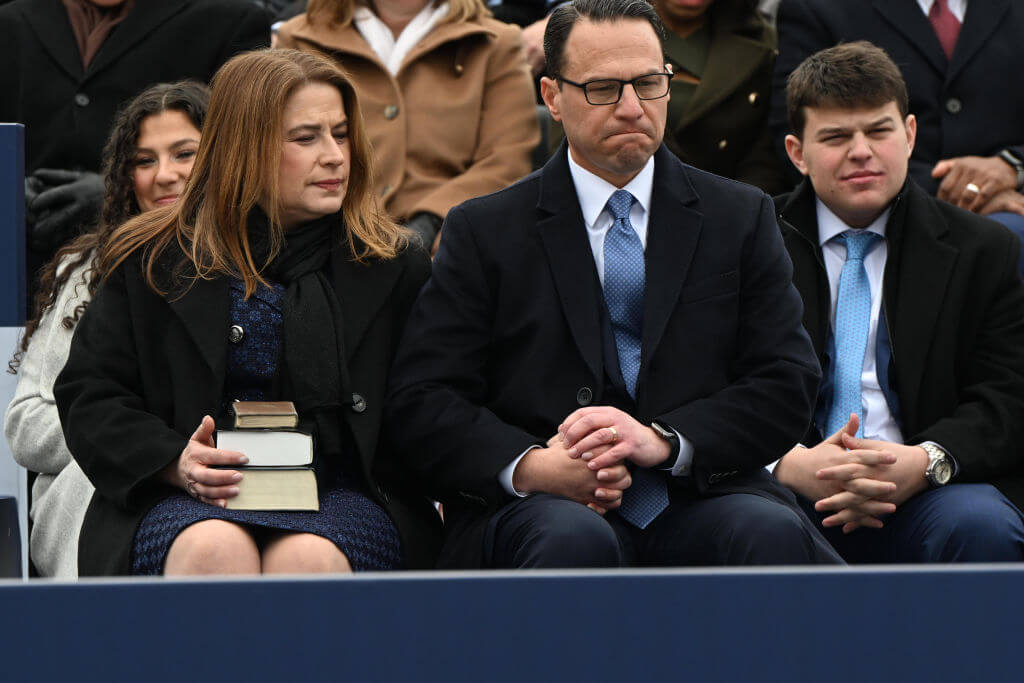The Pittsburgh synagogue shooter got the death penalty. Pennsylvania’s Jewish governor is mum on the sentence.
Gov. Josh Shapiro said earlier this year he no longer supports capital punishment even for those committing the most heinous crimes

Josh Shapiro’s wife Lori holds three Bibles for the swearing in on Jan. 17, 2023. Photo by Mark Makela/Getty Images
Many family members and survivors of the deadly attack at Pittsburgh’s Tree of Life synagogue in 2018, followed by Jewish American groups, welcomed a jury’s decision Wednesday to sentence Robert Bowers to death for killing 11 worshippers in the deadliest act of antisemitism in the nation’s history.
But Gov. Josh Shapiro, who proudly embraces his Jewish faith and in January was sworn in on a Bible that was rescued from the synagogue attack, made no mention of the punishment in his reaction to the conviction.
“While the memories have been painful over the past several weeks, our justice system did its job,” Shapiro said in a statement posted on Twitter, “and found the murderer responsible for the deadliest act of antisemitism in American history guilty.”
Shapiro said he keeps the Bible which was placed on the prayer platform of the synagogue when worshippers were gunned down in the governor’s office “to remind me of those we lost and what we fight for.”
Differences between what Shapiro and the victims’ families think should happen to Bowers, however, make little practical difference. A governor does not have the power to sign a federal execution warrant or commute a federal sentence.
That fact was noted by a Shapiro administration official on Thursday. Requesting anonymity to discuss the governor’s thinking, he added that the governor’s evolved position on the death penalty stands. Most recently, Shapiro has said he does not believe Pennsylvania should execute anyone.
U.S. Attorney General Merrick Garland in 2021 placed a moratorium on federal executions. That, and the increasing time death row inmates spend between sentencing and executions, mean Bowers could live on death row for many years.
Still, Shapiro’s changing stance on the death penalty surfaces some tension within the Jewish community.
Most but not all of Bowers’ victims’ relatives wanted him to be sentenced to death. But surveys show Jews — far more than most Americans — favor life in prison over the death penalty for convicted murderers. And Jewish teachings calls for capital punishment to be rare.
Shapiro’s death penalty stances
As the state’s attorney general in 2018, Shapiro said he wanted Bowers put to death in line with his belief that the penalty should be reserved for those committing the most heinous crimes.
But in February, weeks after his inauguration, he stood with community leaders and criminal justice advocates and beseeched the state legislature to abolish the death penalty. He said he had evolved on the issue after meeting with some of the families of those slain in the shooting attack.
“They told me that even after all the pain and anguish, they did not want the killer put to death,” Shapiro said. “He should spend the rest of his life in prison, they said, but the state should not take his life as punishment for him taking the lives of their loved ones. That moved me, and that’s stayed with me.”
“The Commonwealth shouldn’t be in the business of putting people to death, period,” Shapiro said. “I believe that in my heart.”
According to the Death Penalty Information Center, 24 states have the death penalty, 23 do not, and three, like Pennsylvania, have the statute on the books but also a governor-imposed moratorium. Pennsylvania has not carried out any executions since 1999.
If there is frustration among Jews in and beyond Pittsburgh with the governor’s failure to endorse the death penalty for Bowers, it has been overshadowed by other sentiments in the wake of the trial.
More palpable, in the courthouse and in the stream of statements released by Jewish groups after the death penalty verdict was announced, were feelings of gratitude — that the trial was over, that the severity of the crime had been acknowledged and that the Jewish community had drawn closer in their devastation and will to rise above it.
“Life sentence, death sentence. Let it be over and let there be healing. Amen,” said Hazzan Alisa Pomerantz-Boro of Congregation Beth El in Voorhees, New Jersey, a close friend of Tree of Life Rabbi Jeffrey Myers.
Survivors and relatives of the 11 victims are expected to confront Bowers with their own stories of grief during a final court hearing on Thursday before the judge sentences him to death.
















